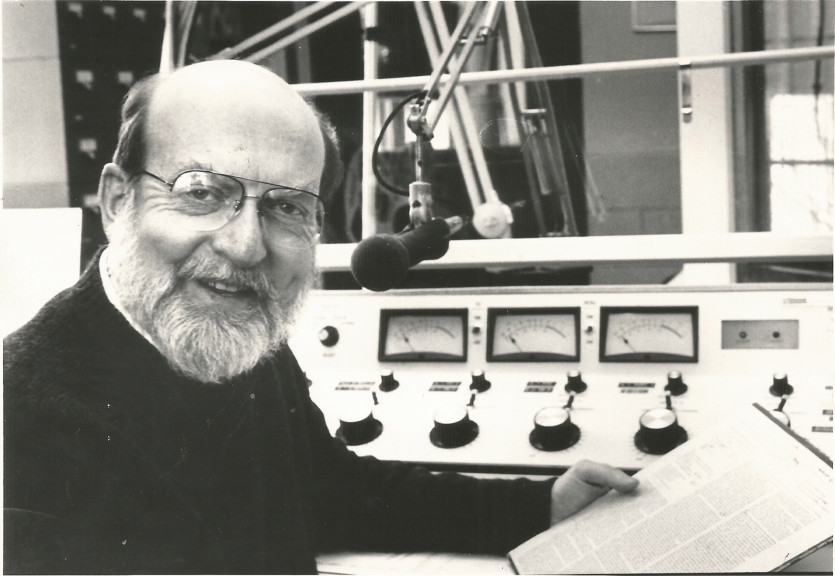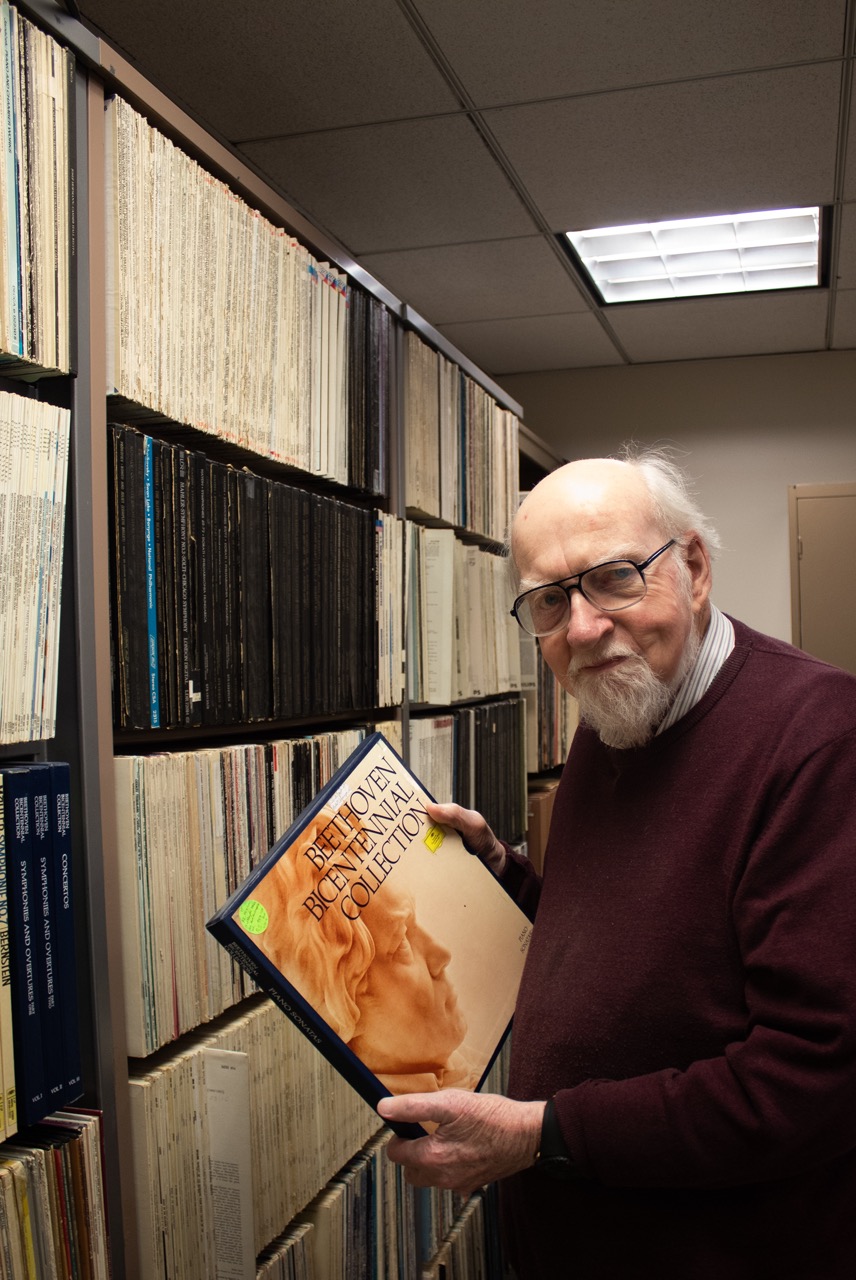“Classics of the Phonograph” Turns 20

June 2024 marks the 20th anniversary of Classics of the Phonograph, hosted and produced by longtime fixture of WILL-FM, John Frayne. We chatted with John to discuss how Classics of the Phonograph came to be, how he approaches programming, and the importance of historical recordings in the digital age.
First, a little background on your host: John Frayne was 14 when he first started collecting records and listening to classical music in his native New York City. He recalled that the first symphony concert he attended was conducted by none other than Leonard Bernstein. He also saw famed Italian maestro Arturo Toscanini conduct an NBC studio broadcast and went to his first opera at the Met as a teenager in 1947. His entry into radio came in college while attending Fordham University. In 1950, he got a job at the college FM station, where he announced an opera program and the station’s evening symphony hour.
After graduation, John spent two years in the Army, with overseas service in Korea. “After I got out of the Army in 1955, I got a job in a record store in New York, The Record Hunter,” John said. It was here that his passion for records grew. “That store was famous for selling collectors’ items, and in 1955, there were still many fans of 78 rpm, mainly vocal, records. I got to manage some branch stores for that outfit, but after two years or so, I left that business and went to grad school to get degrees in English Literature. When we still had Vintage Vinyl sales [at WILL], when I flipped through the LP bins, the artwork on the LPs flashed images of the past before me.”
While earning his master’s degree in English at Columbia University, John continued to soak up as much classical music as he could, attending the opera and the New York Philharmonic as often as his budget allowed. He came to the University of Illinois at Urbana-Champaign in 1965 while completing his PhD at Columbia. He served on the faculty of the University of Illinois as an English professor until his retirement in 1997.

John Frayne in the Friends of WILL Library
His interest and involvement in classical music never waned. In the late 1970s, he was recruited to do reviews for WILL and volunteered to pull records for the live announcers. He also hosted an opera program on community radio station WEFT in the early 1980s. Within the English department, he opened an area of study on opera librettos as a form of literature. While on sabbatical in the 1980s, he immersed himself in the School of Music, auditing courses in music theory and history. In terms of performance, he played piano as a child and took up the cello in adulthood, studying with a professor in the School of Music. Since 2000, he has also contributed reviews of local concerts to the News-Gazette, marrying his interests in music and writing. In recent years, John has been a frequent teacher at the Osher Lifelong Learner Institute, where his special interest is film adaptations of classic novels from the past to the present.
John Frayne’s voice has been a consistent presence on WILL since 1985, when he began hosting Classics by Request, a program he presented for 30 years. He also hosted Prairie Performances until 2015 and still emcees Afternoon at the Opera on Saturday afternoons. In 2004, Program Director Jake Schumacher asked him to do a program on historical recordings as a summer fill-in for Prairie Performances. “My answer was a resounding ‘yes.’” John recalled. “Jake was aware of my absorbing interest in old recordings. The title was decided upon after much arguing over many possibilities. After I repeated the show in the summer of 2005, it was decided that the show would continue all year round. The show began as a Sunday afternoon, two-hour program, then morphed into a one-hour show. The time varied for a while. For one stretch it was on Sunday evenings after Prairie Performances, which I was announcing at that time. Finally, it settled onto Saturday mornings at 11.”
When planning his weekly programs for Classics of the Phonograph, John usually focuses on one composer or performer. For instance, if a famous artist has recently passed away, he might plan a memorial program. “I try to vary the subjects: conductor, instrumentalists (and type of instrument), composers, musical works, recording history, recent deaths, anniversaries, and so on,” he said. “In approaching a decision, I try to let my mind roam over new ideas, subjects that should be revisited, new developments, things never done before, new issues of large collections summarizing a career’s achievements.”
So, what constitutes a historical recording? “The term ‘historical’ can be applied in several meanings to recordings,” John explained. “I would say that a historical recording is one which was made by a now outmoded recording process, or one which preserves the performing of an artist from a past generation.”
“I am especially fascinated with the early electric period of recording, roughly from 1925 to the early 1930s,” John added. “From there on, I cover the end of the 78 era (to 1950), then the mono LP era (to the late 1950s), then stereo LPs and cassettes, onto the onset of digital recordings and CDs (from about 1980 and 1985). There has been a massive project to issue important recordings of the 78 and LP eras onto CD, and I have relied more and more on CD versions of historical recordings.”
John mostly draws from his own record collection for the show. “I have been collecting historic recordings on CD for some time, and I still have many of the original LPs—less so the original 78 rpm records,” he said. “My family and I must have some space to live in. (The station myth at WILL is that I have a barn full of records. Not true, but a farmhouse full of them, yes.) The Friends Library was not designed to develop a historical collection. But recent bequests to the station library have made our collection a rich resource in older recordings.”
For instance, some of these recordings came from longtime listener and supporter of WILL Terry England. “Shortly after my parents had to leave the family home in the early 2000’s, I received their collection of vinyl recordings,” England said. “As a devoted listener to Classics of the Phonograph, I contacted John to find out whether he would like to add any to the WILL Friends library of recordings. Subsequently, I spent part of a Saturday morning with him as he selected 125. If memory serves, I learned that a dozen were recorded in New York City at performances he attended. Others were recordings he sold to finance his education. His enjoyment in receiving them was obvious. The morning made me and would have made my parents pleased.”
Former Director of Development Danda Beard also had a few chances to work alongside John during her tenure at IPM. “We sorted heavy (often dusty) vintage vinyl, enjoyed musical programs in the TV studio, watching along with the crew and volunteers, and asked Friends of WILL to support the stations from the radio studios,” she reminisced. “It was always fun because there was storytelling to go along with the work! Every week we hear some more stories on Classics of the Phonograph. The weekly scripts are consistently captivating. We’re fortunate to have John with us, and the program to call ‘our own' here at WILL.”
When asked about the place and value of programs like Classics of the Phonograph and the preservation of historical recordings more broadly, John replied that he doesn’t think the record as a physical object will ever disappear. “People still like, even love, physical objects, whether cars, violins, or old wine bottles. It seems to me that we are in a golden age in the recovery of the knowledge of the history of classical music. The sheer amount of old music being recorded is amazing. To be sure, the audience for that music is very small, but it is a dedicated audience. I find it hard to believe that there will be a generation of young performers who are not interested in hearing how Casals, or Rachmaninoff, or Kreisler performed music.”
John lamented that most syndicated classical music radio programs never play mono records, “even though some of the greatest conductors and instrumentalists recorded before stereo recordings.” He continued, “To be sure, an interest in the past should be balanced for a concern for the musical life of the present and the future.”
This is not to say that he is against technological advancements. “I began collecting records around 1945,” he said, “so I have seen the decline and fall of 78s, LPs, reel-to-reel tapes, mono recording, analog recording, cassettes, and now CDs and DVDs. At each stage I have said, ‘No, I am not going to collect everything all over again!’ and I went ahead and did just that.”
Tune into Classics of the Phonograph Saturdays at 11 a.m. on WILL-FM 90.9.



